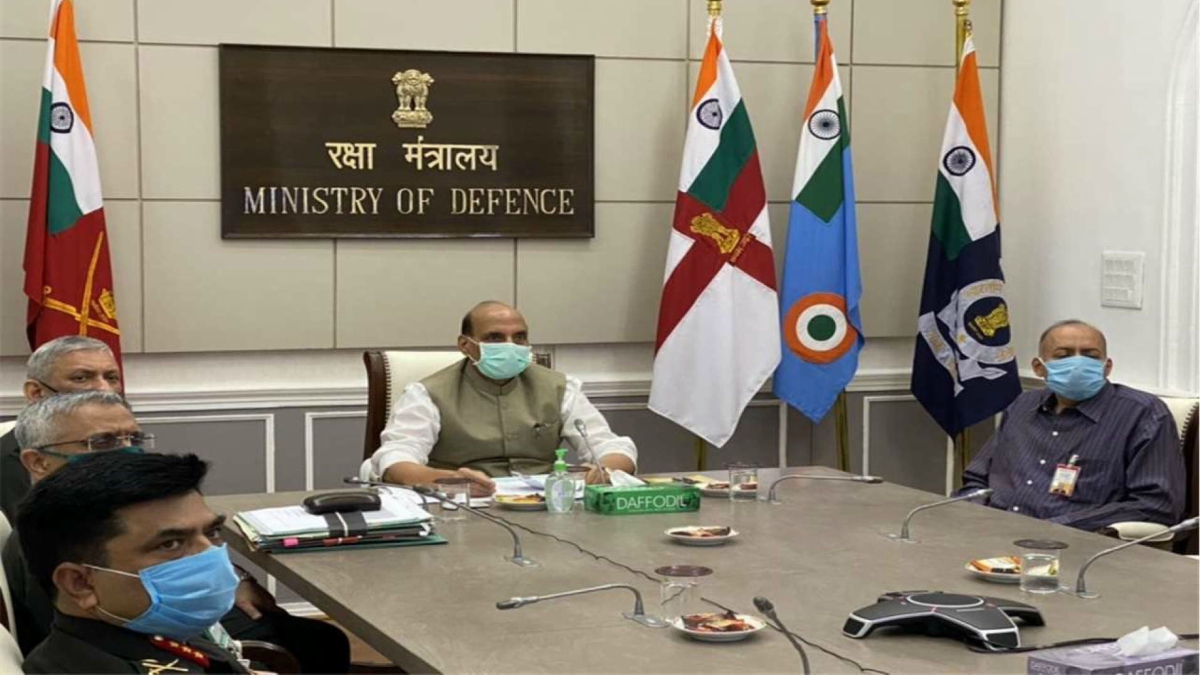The Defence Acquisition Procedure (DAP) 2020, which was unveiled by Defence Minister Rajnath Singh recently, has been aligned with the government’s vision of ‘Aatmanirbhar Bharat’ and gives an impetus to the ‘Make in India’ initiative.
The Defence Minister also unveiled a new version of the procurement manual of the premier military research institute DRDO that features simplified procedures for involvement of the private sector in various research and development projects.
“The first Defence Procurement Procedure (DPP) was promulgated in the year 2002 and has since been revised periodically to provide impetus to the growing domestic industry and achieve enhanced self-reliance in defence manufacturing,” said a statement from the Ministry of Defence (MoD).
“Raksha Mantri had approved the constitution of the Main Review Committee under Chairmanship of DG (Acquisition) Mr. Apurva Chandra in Aug 2019 for preparation of DAP-2020,” the statement added. DAP 2020 is now applicable with effect from 01 October 2020.
Formulation of DAP 2020 has been done over more than one year, incorporating comments/suggestions from a wide spectrum of stakeholders as under:
DAP 2020 has been aligned with the vision of the Government of Aatmanirbhar Bharat and empowering Indian domestic industry through Make in India initiative with the ultimate aim of turning India into a global manufacturing hub. With the new Foreign Direct Investment policy announced, DAP 2020 has adequately included provisions to encourage FDI to establish manufacturing hubs both for import substitution and exports while protecting interests of Indian domestic industry.
Specific reforms enunciated in Aatmanirbhar Bharat Abhiyan, have been incorporated as under:
(a) Notify a List of Weapons/Platforms for Ban on Import: Relevant incorporation has been done in the DAP to ensure that no equipment as mentioned in the list is procured ex import post timelines notified.
(b) Indigenisation of Imported Spares:
(i) Request For Information: RFI stage will explore willingness of the prospective foreign vendors to progressively undertake manufacture and setup an indigenous eco system at the spares/sub component level.
(ii) New Category of Buy (Global – Manufacture in India): The new category incorporates ‘manufacture of either the entire/part of the equipment or spares/assemblies/sub-assemblies/Maintenance, Repair and Overhaul (MRO) facility for the equipment, through its subsidiary in India.
(iii) Co-production through IGA: This enables establishment of co-production facilities through IGA achieving ‘Import Substitution’ and reduces Life Cycle Cost.
(iv) Contractual Enablement: Buyer’s Right to optimise Life Cycle Support costs and system enhancements through indigenous eco system incorporated.
(c) FDI in Defence Manufacturing: With the announcement of new FDI Policy, suitable provisions have been incorporated like new category ‘Buy (Global – Manufacture in India)’ done to encourage foreign OEMs to setup ‘manufacturing/maintenance entities’ through its subsidiary in India while enabling requisite protections to domestic industry.
(d) Time Bound Defence Procurement Process and Faster Decision Making: As part of the Defence Reforms announced in the Aatmanirbhar Abhiyan, setting up of a PMU has been mandated to support contract management. The PMU will facilitate obtaining advisory and consultancy support in specified areas to streamline the Acquisition process. Other issues included in these reforms are:
(i) Realistic Setting of GSQRs of Weapons/Platforms. The process of formulation of SQRs has been further refined with greater emphasis on identifying verifiable parameters based on analysis of ‘Comparative’ equipment available in the World and Domestic markets.
(ii) Simplification of Trial Procedures: DAP 2020 emphasises the need to conduct trials with an objective to nurture competition based on the principles of transparency, fairness and equal opportunities to all and not as a process of elimination.
Ease of Doing Business: One of the key focus areas of the review was to implement ‘Ease of Doing Business’ with emphasis on simplification, delegation and making the process industry friendly with certain specific provisions incorporated:
(a) Procedural Changes: Single stage accord of AoN in all cases upto Rs 500 crores has been instituted thereby reducing time. FTP cases, post accord of AoN, will be progressed as per delegated powers thereby reducing the procurement cycle considerably.
(iii) In the Planning Process, LTIPP has been re-designated as Integrated Capability Development Plan (ICDP) covering a planning period of ten years instead of 15 years.
(b) Request for Proposal (RFP) and Standard Contract Document (SCD): Certain measures to provide clarity and alignment of requirements as also enabling provisions have been incorporated in the RFP and SCD in terms of Flow Chart driven guidelines, provision of in-storage preservation and termination of contracts in cases where projects are not progressing as per pre–defined milestones.
SALIENT FEATURES OF DAP 2020
Reservation in Categories for Indian Vendors. The categories of Buy (Indian-IDDM), Make I, Make II, Production Agency in Design & Development, OFB/DPSU and SP model will be exclusively reserved for Indian Vendors meeting the criteria of Ownership and Control by resident Indian Citizens with FDI not more than 49%. This reservation will provide exclusivity in participation to the domestic Indian industry.
ENHANCEMENT OF INDIGENOUS CONTENT.
(a) Overall Enhancement in Indigenous Content (IC). (b) IC Verification: A simple and practical verification process has been instituted and IC will now be calculated on ‘Base Contract Price’ i.e. Total Contract Price less taxes & duties.
(c) Indigenous Military Material: Promoting use of indigenous military material with provisions for examination of platforms and other equipment/ systems and reward for vendors for using indigenous raw material.
(d) Indigenous Software: Provision for exploring options for operating base applications like Fire Control System, Radars, Encryption, Communications etc on indigenous software in Buy (Indian- IDDM) & Buy (Indian) cases has been included.
RATIONALISATION OF TRIAL AND TESTING PROCEDURES.
(a) Testing equipment based on its employability and for other conditions appropriate certifications confirming functional effectiveness may be obtained.
(b) Scope of Trials will be restricted to physical evaluation of core operational parameters, other parameters may be evaluated based on vendor certification, certification by accredited laboratories, computer simulations of parameters..
(c) Avoid duplication of trials and waiver will be granted based on Certificates of Conformance. Ensure simultaneity of various Trials and wherever feasible, entire trials be conducted by a Combine Trial Team in order to save time.
(d) Requisite opportunity will be afforded to participating vendors to rectify shortcomings/faults during the Trials with permission to carry out repairs.
(e) Request For Proposal will apprise vendors to submit draft Acceptance Test Procedure (ATP), to be finalised by QA agency during Technical Trials itself. Sample size for destructive tests including the aspect of cost to be borne by the seller will be stated upfront in the RFP for the vendor.
(f) Inspections: No repetition of inspections will be done especially during acceptance of equipment. Third Party Inspections will also be carried out.
MAKE & INNOVATION.
(a) Make I (Government Funded upto 70%). Laying down a cap of Rs 250 crore/DA and selection of DAs based on bidding criteria.
(b) Make II (Industry Funded) for production of indigenously designed & developed weapons/equipment/systems/platforms along with sub components/assemblies.
(c) Make III (Indigenously Manufactured) category for manufacture of equipment/platforms or spares/assemblies/sub-assemblies for enabling import substitution.
(d) Procurement of prototypes developed through ‘Innovation’ under various initiatives like iDEX, Technology Development Fund and Internal Services Organisations has been facilitated.
DESIGN & DEVELOPMENT
A separate dedicated chapter has been incorporated in the DAP 2020 for acquisition of systems Designed and Developed by DRDO/DPSUs/OFB. A simplified procedure with Integrated Single Stage Trials to reduce timelines and laying greater emphasis on evaluation through certification and simulation. Aspects of Spiral Development have been incorporated.
ADDRESS VOIDS
Certain existing voids have been addressed in the form of new Chapters as under:
(a) ‘Information Communication Technology’: Peculiar issues related to procurement of ICT intensive equipment especially of Interoperability & Built-in Upgradability, enhanced security requirements and change management have been included.
(b) Leasing: A new category introduced to enable operating of assets without owning thereby, substitute huge initial capital outlays.
(c) Post Contact Management: To formalise procedures post signing of contract with respect to inspections, levying of Liquidity Damages, Contract Amendments etc.
(d) Other Capital Procurement Procedure: A new procedure has been included as a new chapter in DAP and structured as an enabling provision for Services to procure essential items through Capital Budget under a simplified procedure in a time bound manner.
INDUSTRY FRIENDLY COMMERCIAL TERMS
Price Variation Clause has been incorporated for large and protracted contracts in order to avert inflated initial quotes by vendors and arriving at a realistic price of the project. Suitable provisions like parallel processing of documents by SHQ/PCDA through digital verification, within laid down timelines, has been included to ensure timely payment to vendors. Payments to Indian industry have been aligned with foreign industry.
OFFSETS
The Offset guidelines have been revised, wherein preference will be given to manufacture of complete defence products over components and various multipliers have been added to give incentivisation in discharge of Offsets. In fact, DAP 2020 is an enabler and industry friendly procedure. It instills confidence and will meet aspirations of stakeholders across the spectrum.
DRDO PROCUREMENT MANUAL 2020
To encourage more participation of Indian industry, including Start-ups and MSMEs in Defence Research & Development (R&D) for achieving ‘Atmanirbhar Bharat’, a newer version of Defence Research and Development Organisation (DRDO) Procurement Manual 2020 (PM-2020) has been released. It will facilitate the indigenous Defence Industry by simplifying the processes and ensure their participation in design and development activities. The PM-2020 will help towards realising Prime Minister Shri Narendra Modi’s dream of ‘Atmanirbhar Bharat’.
The PM-2020, will facilitate faster execution of R&D projects/programmes. The modified features the Manual will go a long way to facilitate participation of industry in various R&D projects. Bid security declaration option for earnest money deposit, increase of threshold limit for advance payment, placement of order on lowest bidder 2 (L2) in case L1 backs out are some of the salient features of the new manual, which will assist the industry for the speedy execution of projects. Some more enabling measures of PM-2020 are exemption of bid security and performance security up to Rs 10 lakh, no negotiations for commercial off-the-shelf (COTS) items/services wherever price discovery is happening through market forces. Performance security for service contracts is linked to the payment cycle instead of total contract value. Procurement of stores from development partners, safeguarding of free issue material through insurance cover instead of bank guarantee (BG) are other facilitating measures adopted to help the industry. In the new PM-2020, the liquidated damage (LD) rate for development contracts has been reduced. The delivery period (DP) extension process has been simplified for faster decision making. Many of the internal procedures have been further simplified for faster engagement with industry. The previous Procurement Manual of DRDO was last modified in 2016.










